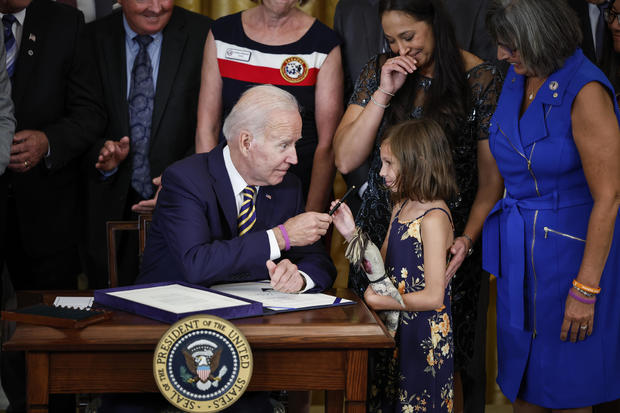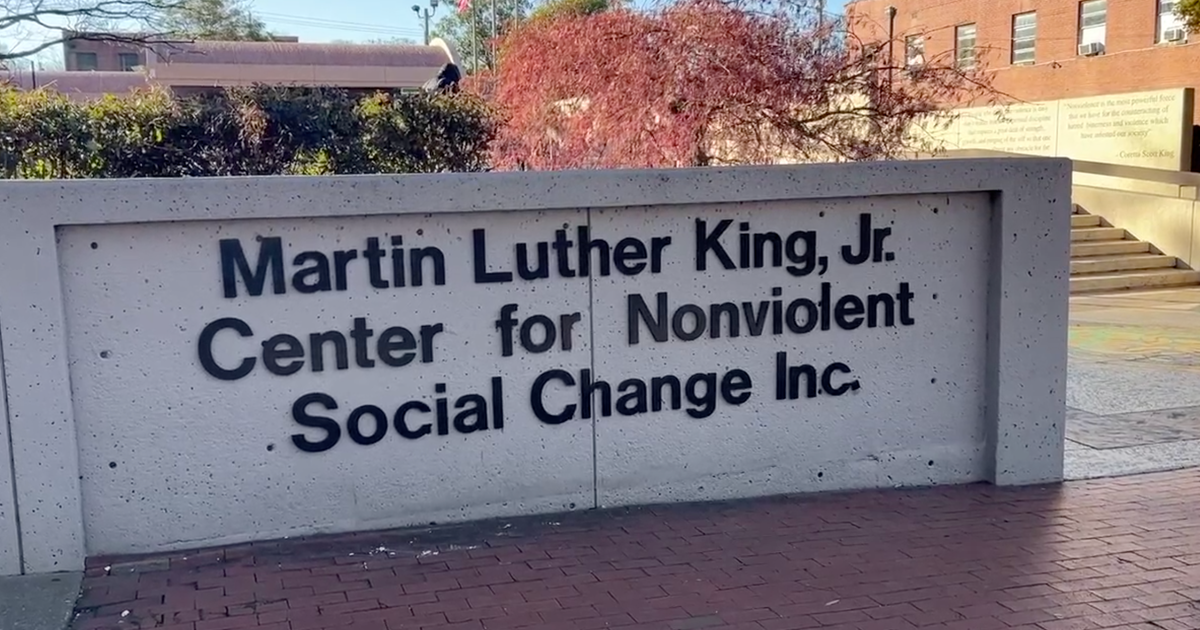Biden signs burn pit legislation into law, expanding health care benefits for veterans
Washington — President Biden on Wednesday signed into law legislation that expands health care benefits for veterans who developed illnesses because of their exposure to toxic substances from burn pits on U.S. military bases during their service.
The bill, called the PACT Act and named for Sgt. First Class Heath Robinson, is the largest expansion of health care benefits for veterans exposed to toxins in more than 30 years. It's expected to extend eligibility for medical care to roughly 3.5 million veterans potentially impacted by toxic exposure.
"The PACT Act is the least we can do for the countless men and women, many of whom may be in this room for all I know, who suffered toxic exposure while serving their country," Mr. Biden said in remarks before signing the bill. "This new law matters. It matters a lot."
The president pledged the Department of Veterans Affairs will move "as quickly as possible" in processing and resolving claims from veterans seeking care.
"This law is long overdue, but we finally got it done together," he said.
The legislation cleared the Senate with broad bipartisan support last week, just days after GOP senators blocked the measure from advancing over objections over how the benefits are paid for. The House approved the measure last month.
In attendance for the bill-signing was comedian Jon Stewart, who championed the legislation and lambasted Republicans for delaying passage of the bill. The president thanked Stewart for pressuring Congress and advocating for veterans and their families, saying "we owe you big."
"To the veterans and their families here today and all around the country, we can never fully thank you for your service and your sacrifice. And that's not hyperbole, that's a literal fact," Mr. Biden said. "We owe you. You're the backbone. You're the steel. You're the very fiber that makes this country what it is."
Mr. Biden has been an advocate of the bill and issued a call-to-action during his first State of the Union address in March for Congress to assist veterans experiencing enduring health issues after exposure to the burn pits while serving in Iraq and Afghanistan. Robinson's widow Danielle was a guest of first lady Dr. Jill Biden for the address, and, with her daughter Brielle Robinson, stood alongside Mr. Biden as he signed the burn pit legislation into law.
"Ours is just one story," Danielle Robinson said in brief remarks introducing Mr. Biden. "So many military families have had to fight this terrible emotional battle, so many veterans are still battling burn pit illnesses today, too many have succumbed to those illnesses as well."
During remarks before signing the legislation, Mr. Biden recalled making numerous visits to Iraq while serving as chairman of the Senate Foreign Relations Committee and then as vice president, and seeing in the air the pollutants from the large pits where materials like tires, chemicals and jet fuel were incinerated on U.S. bases, close to where troops slept and ate.
"It was there all the time, toxic smoke thick with poison spreading through the air and into the lungs of our troops," he said. "When they came home, many of the fittest and best warriors that we sent to war were not the same. Headaches, numbness, dizziness, cancer."
The president has speculated that exposure to toxic substances from burn pits added to health problems for his late son, Beau Biden, who died of brain cancer in 2015. Beau Biden, a major in the Army National Guard, deployed to Iraq for a year in 2009.
"I was going to get this done come hell or high water," Mr. Biden said of the legislation.
In addition to expanding access to health care services, the measure removes the burden on certain veterans and their loved ones to prove service connection if diagnosed with one of 23 specific conditions, including 11 respiratory-related conditions, several forms of cancer and brain cancers.
While the legislation had support from Republicans and Democrats alike, its passage appeared in jeopardy after Republicans pulled their backing in a procedural vote. GOP Sen. Pat Toomey of Pennsylvania objected to language in the bill that would move $400 billion in preexisting discretionary veterans spending to make it mandatory, but his attempt to change the measure failed.
The blockade by Republicans brought veterans to the steps of the Senate to protest their opposition, and after days of braving the elements, the measure cleared with opposition from 11 members.






